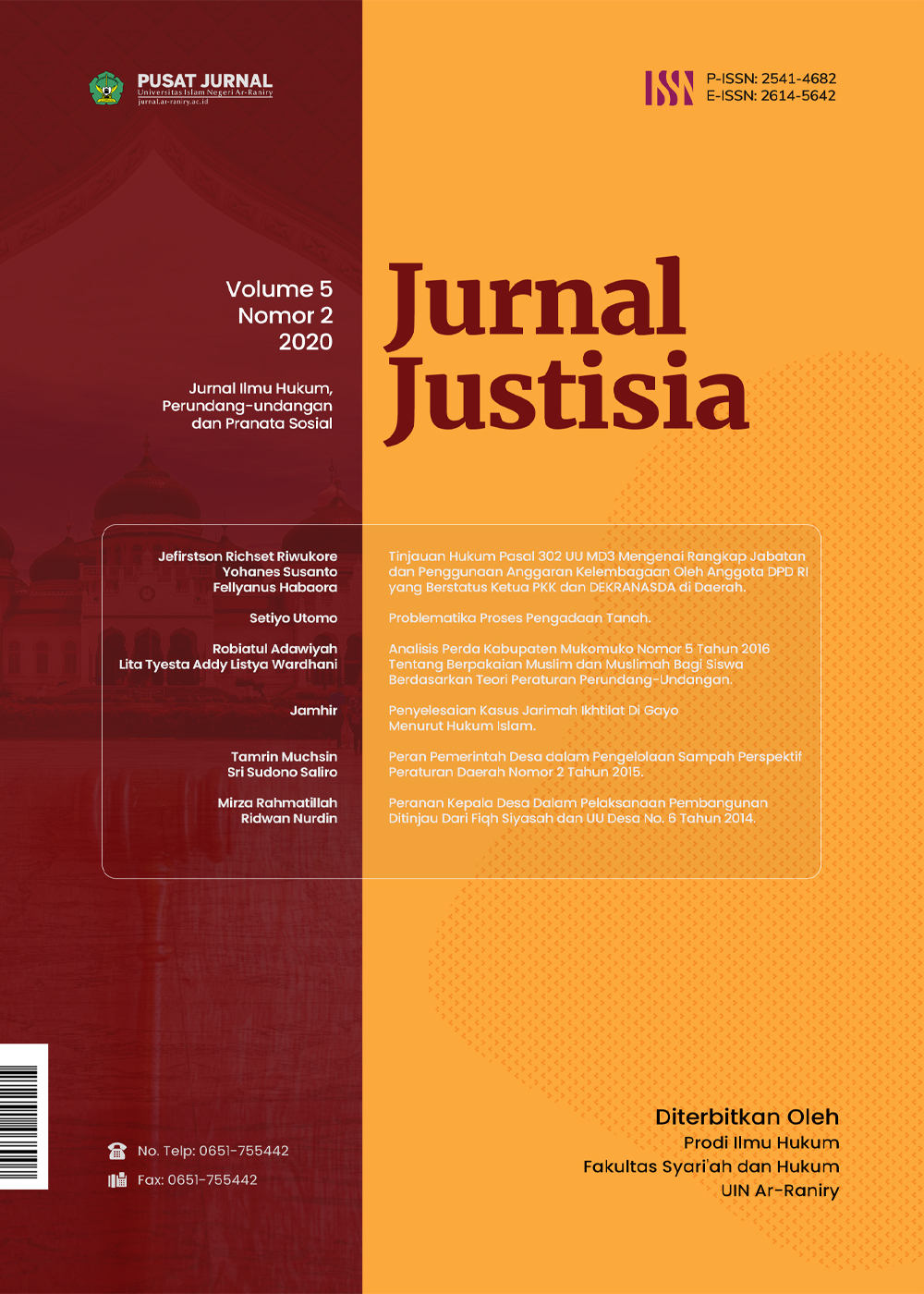Analisis Perda Kabupaten Mukomuko Nomor 5 Tahun 2016 Tentang Berpakaian Muslim dan Muslimah Bagi Siswa Berdasarkan Teori Peraturan Perundang-Undangan
DOI:
https://doi.org/10.22373/justisia.v5i2.8453Abstract
In the context of implementing autonomy and co-administration, local governments have right to make regional regulations. This authority opens the opportunity for the emergence of regional regulations with Islamic nuances, for example the Mukomuko Regency Regional Regulation Number 5 of 2016. This raises pros and cons among the community. Therefore, this is very important to be studied comprehensively. The research method used is normative. As for the issues raised: first, What is the content of the provisions of the Mukomuko District Regulation Number 5 of 2016? second, What is the Regional Regulation of Mukomuko Regency Number 5 of 2016 based on the theory of statutory regulations? Based on research results, that the regional regulation is a sharia-based regional regulation that regulates moeslim dress. In the formation of regulations, including at the regional level, it must not conflict with Pancasila and also the content material principles in Law of PPPU. When referring to Guidelines for Legal Analysis and Evaluation Number PHN-01.HN.01.03 of 2019 which is result of breakdown of Pancasila and Law of PPPU, it is found that based on the variables and indicators of assessing values of Pancasila, this is contrary to the variable of plowing, humanity, nationality, Diversity in Unity, justice, equality in law and government, and legal order and certainty. And type of statutory regulation, namely this regional regulation is not appropriate. This regional regulation also creates disharmony in regulations.
References
Asmar, Abd Rais. “Pengaturan Peraturan Daerah (Perda) Syariah dalam Penyelenggaraan Pemerintahan Daerah.” El-Iqtishady 1, no. 1 (2019): 62–67.
Asshiddiqie, Jimly. Perihal Undang-Undang. Ed.1 Cet.4. Depok: Rajawali Pers, 2017.
BPS Kab. Mukomuko. Kabupaten Mukomuko dalam Angka 2020. Mukomuko: BPS Kab. Mukomuko, 2020.
Daulay, Mhd. Nur Husein. “Efektifitas Penerapan Peraturan Daerah Busana Muslim Muslimah dalam Mendorong Pelaksanaan Ajaran Islam : Studi Kasus di Sekolah Menengah Atas Negeri 5 di Kota Padangsidimpuan.” AT-TAFAHUM: Journal of Islamic Law 1, no. 1 (2017): 99–115.
Dewi, Anak Agung Istri Ari Atu. Penyusunan Perda yang Partisipatif: Peran Desa Pakraman dalam Pembentukan Peraturan Daerah. Diedit oleh Gede Marhaendra Wija Atmaja. Bali: Zifatama Jawara, 2019.
Hanum, Cholida. “Analisis Yuridis terhadap Asas-Asas Pembentukan dan Asas-Asas Materi Muatan Peraturan Daerah : Kajian Perda Syariah di Indonesia.” Jurnal Agama dan Hak Azazi Manusia 7, no. 1 (2017): 41–63.
Harahap, Zul Anwar Ajim. “Dampak Pelaksanaan Peraturan Daerah Terhadap Pemakaian Busana Muslim di Kecamatan Padangsidimpuan Tenggara.” Jurnal El-Qanuny 4, no. 1 (2018): 16–30.
Na’imah, Hayatun, dan Bahjatul Mardhiah. “Perda Berbasis Syariah dan Hubungan Negara-Agama dalam Perspektif Pancasila.” MAZAHIB: Jurnal Pemikiran Hukum Islam XV, no. 2 (2016): 151–67.
Nasution, Bahder Johan. Metode Penelitian Ilmu Hukum. Cet.2. Bandung: Penerbit CV. Mandar Maju, 2016.
Pedoman Analisis dan Evaluasi Hukum Nomor PHN-01.HN.01.03 Tahun 2019.
Peraturan Daerah Kabupaten Mukomuko Nomor 4 Tahun 2009 tentang Urusan Pemerintahan Daerah Kabupaten Mukomuko.
Peraturan Daerah Kabupaten Mukomuko Nomor 5 Tahun 2016 tentang Berpakaian Muslim dan Muslimah bagi Siswa.
Saraswati, Nur Chanifah, dan Encik Muhammad Fauzan. “Kontitusionalitas Peraturan Perundang-undangan Berbasis Syariah di Indonesia.” Simposium Hukum Indonesia 1, no. 1 (2019): 496–510.
Soekanto, Soerjono, dan Sri Mamudji. Penelitian Hukum Normatif: Suatu Tinjauan Singkat. Ed.1 Cet.19. Depok: Rajawali Pers, 2019.
Sudarno, Jaja. “Jumlah Penduduk Berdasarkan Agama yang Dianut se-Provinsi Bengkulu,” 28 Agustus 2017. https://bengkulu.kemenag.go.id/artikel/42771-jumlah-penduduk-berdasarkan-agama-yang-dianut-se-provinsi-bengkulu.
Suharso, Pudjo. “Pro Kontra Implementasi Perda Syariah (Tinjauan Elemen Masyarakat).” Al-Mawarid XVI (2006): 229–35.
Undang-Undang Dasar Negara Republik Indonesia Tahun 1945.
Undang-Undang Republik Indonesia Nomor 12 Tahun 2011 tentang Pembentukan Peraturan Perundang-Undangan sebagaimana telah diubah dengan Undang-Undang Republik Indonesia Nomor 15 Tahun 2019.
Undang-Undang Republik Indonesia Nomor 3 Tahun 2003 tentang Pembentukan Kabupaten Muko-Muko, Kabupaten Seluma, dan Kabupaten Kaur di Provinsi Bengkulu Undang-Undang Republik Indonesia Nomor 32 Tahun 2014 tentang Pemerintah Daerah dengan perubahan terakhirnya Undang-Undang Nomor 9 Tahun 2015.
Undang-Undang Republik Indonesia Nomor 32 Tahun 2014 tentang Pemerintah Daerah dengan perubahan terakhirnya Undang-Undang Nomor 9 Tahun 2015.
Undang-Undang Republik Indonesia Nomor 39 Tahun 1999 tentang Hak Asasi Manusia.
Wardhani, Lita Tyesta Addy Listya, dan Adissya Mega Christia. Perda Berbasis Muatan Agama: Problematika, Pembinaan dan Pengawasan. Yogyakarta: Bildung, 2020.
Wibowo, Ari. “Pengaturan Peraturan Daerah Kabupaten Solok Nomor 6 Tahun 2002 tentang Berpakaian Muslim dan Muslimah dalam Perspektif Hukum Ketatanegaraan Indonesia.” Jurnal Hukum 14, no. 3 (2007): 413–43.
Downloads
Published
Issue
Section
License
The Authors submitting a manuscript do so on the understanding that if accepted for publication, copyright of the article shall be assigned to Jurnal Justisia : Jurnal Ilmu Hukum, Perundang-undangan dan Pranata Sosial, Ar-Raniry State Islamic University, Indonesia as the publisher of the journal.
Jurnal Justisia : Jurnal Ilmu Hukum, Perundang-undangan dan Pranata Sosial right of first publication with the work simultaneously licensed under Creative Commons Attribution-ShareAlike 4.0 International License (CC BY-SA 4.0) that allows others to share (copy and redistribute the material in any medium or format) and adapt (remix, transform, and build upon the material) the work for any purpose, even commercially with an acknowledgment of the work's authorship and initial publication in Jurnal Justisia : Jurnal Ilmu Hukum, Perundang-undangan dan Pranata Sosial. Authors are able to enter into separate, additional contractual arrangements for the non-exclusive distribution of the journal's published version of the work (e.g., post it to an institutional repository or publish it in a book), with an acknowledgment of its initial publication in Jurnal Justisia : Jurnal Ilmu Hukum, Perundang-undangan dan Pranata Sosial. Authors are permitted and encouraged to post their work online (e.g., in institutional repositories or on their website) prior to and during the submission process, as it can lead to productive exchanges, as well as earlier and greater citation of published work (See The Effect of Open Access).

